
Mini Leadership Summit at the Ubuntu Developer Summit
In the recent feedback I have been gathering from our community, one source of contention was a feeling that leaders in the community are lacking motivation and a feeling of influence on the project. While [the survey](https://archivedblog.jonobacon.com/2011/10/07/feedback-welcome/) is still gathering responses (so treat the percentages below as subject to change), the results currently indicate three interesting pieces of information that relate to leadership:
* Most people see themselves as leaders in the community, either all the time (**25%**), or sometimes (**45%**).
* Most people that responded would be interested in being a leader (**59%**).
* Many people feel empowered to be a leader (**46%**), with some not really (**33%**), and some not at all (**20%**).
These survey results (so far) suggest to me that many people feel a sense of leadership, would be interested in pursuing leadership, but we could make some improvements in empowering them to join us as leaders. These results are positive, and give us a good sense of where to focus some of our efforts: making leadership more accessible and attractive to our community.
In addition to this I have been reaching out to many of our current leaders to get their input on leadership in Ubuntu and there were some common themes:
* Ubuntu can sometimes feel a little *over-governed*.
* It would be useful to support leaders more.
* Some new blood would be good in our existing boards.
* Leaders want to feel a renewed sense of motivation in how they can bring leadership to the community.
* Some boards have more motivational challenges than others.
With the [recent re-election of the Community Council](https://ftbeowulf.wordpress.com/2011/10/15/new-ubuntu-community-council-elected/) as well [as the Technical Board](https://fridge.ubuntu.com/2011/10/05/technical-board-2011/), we have some of this new blood joining these councils (as well as some familiar faces), and now seems a great time to focus on these challenges.
## The UDS Leadership Mini-Summit
A suggestion I presented to some of our leaders was the idea of a mini-summit on leadership at UDS. This would be two afternoons in which we will discuss a range of leadership topics (suggested by the community) and use it as an opportunity to identify areas of focus, improvements, solutions, and best practice. The idea was well received, so we started gathering some topics for discussion.
These topics are available [on this wiki page](https://wiki.ubuntu.com/UDS-P/LeadershipSummit) and I would like to encourage you folks to suggest your own ideas too.
At the beginning of the first leadership mini-summit afternoon we will review the list of topics and get an idea of the popularity of each suggestion and then discuss as many topics as possible in order of popularity.
## When?
The leadership mini-summit will take place at the [next UDS](https://uds.ubuntu.com) from **3pm** – **6pm Eastern USA time** on **Tues 1st Nov 2011** and **Thu 3rd Nov 2011** in the **Bonaire 2** room and is completely open to everyone (including [remote participants](https://uds.ubuntu.com/participate/remote/). I am going to try and ensure all the sessions are videoed so we can share them with our wider community after the event, and we will encourage participants to work together to take notes.
I look forward to seeing your ideas and your input at the leadership mini-summit at UDS!
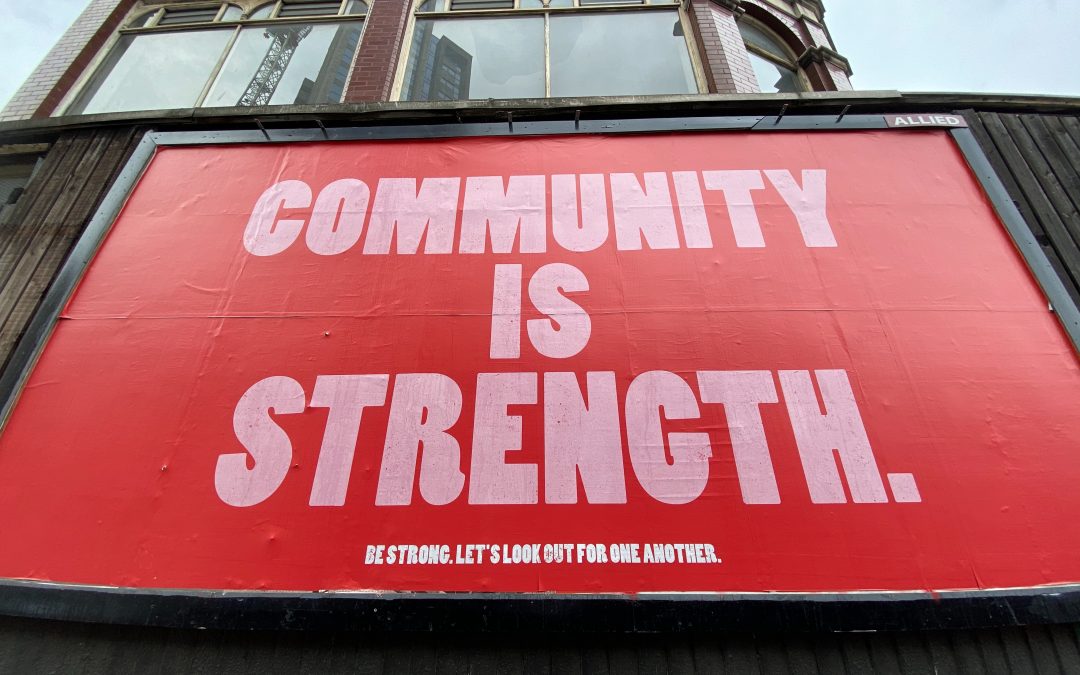
New Community Council
I was delighted to see the results of the Community Council vote. It is great to see some familiar faces on the council as well as some new blood. I am looking forward to working with the CC in the 12.04 cycle, and the new council have a wonderful complement of skills. Congratulations to all involved!

Weekly Canonical Community Team Meetings Now On IRC
Each week I organize a Google+ Hangout for our Canonical Community Team meeting. This regular team meeting is where we share roundtables of work each of us has been doing, sync up on projects and topics, and discuss any agenda items. We also discuss boring company topics like expense reports, booking days off work, and travel arrangements.
One piece of feedback I have seen in the recent research I have been doing with our community is that folks would like to see these weekly meetings be open, and preferably on IRC. This would help provide more transparency around the work of the team, and the meetings could be logged so people could read them later if desired.
I think this was really valuable feedback, so from next week we will be doing exactly this. From next week, our meetings will take place on `#ubuntu-meeting` every Tuesday at 3pm UTC. I have added the weekly meeting to the [Fridge Calendar](https://fridge.ubuntu.com/calendars/).
To be completely clear, this IRC meeting will be in the same form as the meetings we have been doing each week — it is not intended to replace the Community Council, Technical Board or other meetings — it is just a means for the team to sync up, but with the added value of the wider community being welcome to watch the session and feel free to chime in and contribute.
Look forward to seeing some of you there!

Onwards and Upwards
Thanks to everyone who came to the Ubuntu UK Release Party last night. It was so wonderful to catch up with so many new and old friends. It was also wonderful to hear everyone’s generally positive feedback about the new release.
I am proud of Ubuntu 11.10 and what we as a community managed to accomplish. Of course, we have some challenges to solve as we head into the 12.04 cycle, we need to focus on quality more, support our diverse patchwork of community teams to be successful, and motive and energize our leaders. But there are also new opportunities at our feet as we strive to bring Ubuntu and Free Software to *everyone* and we continue to welcome a new generation of Ubuntu community members with each release.
I can’t think of a better community to work with to face our challenges and scale these opportunities. Here’s to 12.04… 🙂

Join The Online Ubuntu Release Party
`#ubuntu-release-party` on [freenode](https://freenode.net/using_the_network.shtml) IRC is all you need to know. 🙂
Come and join the fun!

Ubuntu 11.10 and London Release Party
Today we release [Ubuntu 11.10: Oneiric Ocelot](https://www.ubuntu.com) after a busy six months of work. Thank you to everyone who participated in this release and put their brick in the wall. We had many wonderful contributions from developers, testers, translators, authors, advocates, accessibility folks, marketeers, programmers, governors, and more. I am looking forward to seeing the release hit the tubes. 🙂
This week I have been in London all week for the release week, and it has been a hectic, but useful week. I also used this week to take advantage of the timezone and hop on the phone with some community members on this side of the pond. Thanks to all those for the calls.
Speaking of this side of the pond, I am excited to be able to go to the London release party which takes place tonight on **Thu 13th Oct 2011** from **6.30pm** at [The Cask Pub](https://www.caskpubandkitchen.com/) at **6 Charlwood Street, Pimlico, London, SW1V 6EE**. Thanks to the [Ubuntu UK](https://ubuntu-uk.org/) team for putting together the party, and it looks like there will be a great crowd there. Be sure to [check out the event here](https://loco.ubuntu.com/events/ubuntu-uk/1283/detail/) and register if you plan on coming so the team has an idea of numbers.
Of course, if you are not in London, there may well be a release party near you! Be sure to [see the current list of worldwide events](https://loco.ubuntu.com/events/global/1186/detail/).

Keeping The Feedback Train Rolling
Just a quick thank-you to everyone who has participated so far in the community feedback survey I sent out last week. So far **286** Ubuntu Members have responded to the survey, but I would like to encourage all of you who have not responded to reply. You should have a link in your INBOX.
Thanks also to the folks who have [provided me with email feedback](https://archivedblog.jonobacon.com/2011/10/07/feedback-welcome/) about where you see our community today and the opportunities and challenges it faces. I am also reaching out to some community members to perform a bunch of phone interviews to get more data; I want to ensure I have the clearest, informed picture available. If you would like to share your feedback, please do email me at *jono -AT- ubuntu –DOT– com*.
I am seeing some really interesting patterns forming in the feedback, both positive and negative, and I am looking forward to presenting this feedback soon and working with our community leaders to help drive some solutions forward to ensure our community remains as fun, inspiring and productive as possible.
Thanks, folks.

Feedback Welcome
Recently some concerns were raised to me in a Community Council meeting about some areas of the community, and how much influence and motivation some of our community members feel they have on Ubuntu.
I am determined to identify some solutions for these challenges. Our community should be fun, inspiring, and productive.
I want to start out by learning more about our community’s perspectives, so I issued a survey to all Ubuntu Members to gather some more input and find patterns in areas of success and concern. You folks should have an email about this in your INBOX with a link to the survey. I appreciate if you could take a few minutes to share your thoughts.
I am also interested in soliciting general feedback too from across the community, and I would like to invite those of you who have views or insight into some of these community challenges to send me an email to *jono –AT– ubuntu –DOT– com*. All correspondence will be private and I would like to encourage you to be as frank as possible.
Thanks, everyone.

Get Your App In Ubuntu
Here in the Ubuntu family we have a burning ambition to create Operating Systems for Desktop and Server that is simple, easy to use, available in your language, and entirely free. We believe in technological freedom, open standards, and breaking down the digital divide.
Part of delivering this vision is to provide a wide variety and selection of apps; people love and need apps to do their work. Fortunately we have a stunning developer platform to harness, we have just needed to focus our efforts on improving the awareness, accessibility, usability, and delivery of that platform.
In the Ubuntu 11.10 cycle we have performed a lot of work to ease how you can create apps for Ubuntu and how you can get your apps in the *Ubuntu Software Center* and available to millions of Ubuntu users.
Ubuntu 11.10 is a great platform for creating and delivering applications. We provide:
* **A powerful platform** – Ubuntu provides a power development platform out of the box. Powerful developer tools, comprehensive audio/video/graphics support, support for [integrating with Ubuntu One](https://one.ubuntu.com/developer/), and much more means that whatever the vision for your app in your head, you can deliver it in Ubuntu.
* **Flexible Development Choices** – in Ubuntu we don’t force you into a box with your choice of development framework, but we instead have a variety of powerful options available. Whether you want to write your apps in Python with [PyGTK and Quickly](https://developer.ubuntu.com/get-started/), write them in [C++ and QML with the Qt framework](https://developer.ubuntu.com/get-started/qt-creator), or other solutions, we have options to suit all tastes.
* **Collaborative Development Tools** – writing the first cut of your app is only the beginning. If you are writing an Open Source app we also have a comprehensive collaborative development tool called Launchpad available which allows you to collaborate around code, bugs, planning features, translations, providing support, building packages, and more.
* **Simple Experience for Your Users** – Ubuntu provides an easy to use Ubuntu Software Center that is filled with different apps across a wide range of genres, complete with ratings and reviews, and many can be tested before they are downloaded. Your app will appear seamlessly in the Ubuntu Software Center. When a user chooses your app it is installed effortlessly.
* **We support Open Source and Commercial Apps** – want to sell your app in the Ubuntu Software Center? No problem, we provide a means to handle the app payments as well as reports for how many sales you have made. Want to give your app away for free? No problem, you can deploy your Open Source apps in the Ubuntu Software Center too!
So let’s talk about how all this works.
## Creating Your App
To create your app, you should first go to the freshly released [developer.ubuntu.com](https://developer.ubuntu.com):
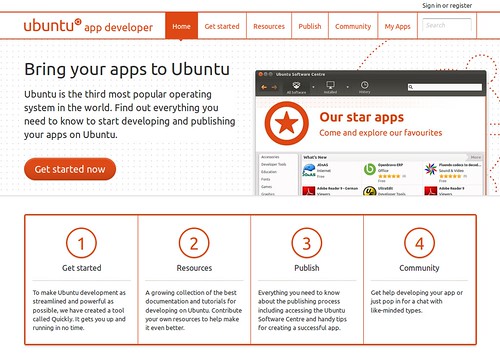
developer.ubuntu.com includes everything you need to get started.
There you can see a video tutorial for [creating an Ubuntu app in five minutes](https://developer.ubuntu.com/get-started/). You can also find [resources](https://developer.ubuntu.com/resources/) including API documentation and tutorials for the platform, developer tools, and more.
If you are creating an Open Source app it is recommended that you upload your application to Launchpad:
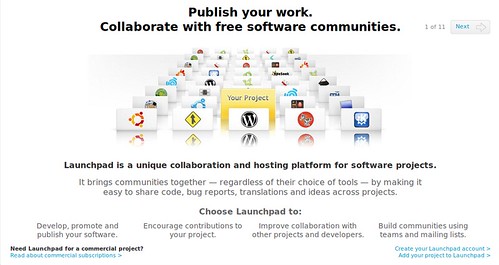
Launchpad provides a raft of features for working together on your apps.
Launchpad provides a variety of different features for working with others around your apps:
* **Working On Code** – Launchpad and Bazaar distributed versional control strip away the barriers to contributing to your project. In just a few key strokes anyone can create their own local branch of your trunk with full version control. When they’re ready, they can upload their branch to Launchpad and propose it for merging back into your trunk. Code review — by web and email — gives you a public forum to discuss and approve or reject the merge. You can even use Launchpad to import Git, CVS and Subversion repositories into Bazaar branches.
* **Bug Tracking** – Free software communities often share code, meaning the same bugs can crop up in different contexts. With Launchpad, you can share bug reports, statuses, patches and comments across project boundaries. You can even share bug data with other trackers, such as Bugzilla and Trac. There’s also everything else you need in a bug tracker: web, email and API interfaces, links between bugs and fixes, team-based delegation and more.
* **Translations** – See your software translated by a community of over 47,000 people working in 293 languages. Launchpad makes translation easy for everyone. Translators get a simple web interface, with automatic suggestions from a library of more than 16 million strings. You, as project owner, decide the balance between openness and quality. And you get standard GNU GetText files for integration with your software.
* **Build Ubuntu Packages** – Build and distribute Ubuntu packages using your own personal APT repository, hosted by Launchpad. Whether you’re publishing experimental builds, backports or betas, your Personal Package Archive lets end-users install your packages using the tools they already know and with automatic updates.
* **Create Feature Specifications** – Community planning for your project’s road map. Anyone can use Launchpad to register a blueprint for your project, while you decide the priority and time-scales. Target chunks of work to forthcoming releases, see who’s working on them and track their progress.
* **Support and Questions** – Track help requests just like bug reports, with community support contacts, statuses and email notifications. When you come across common questions add them to your FAQ library and you get a searchable knowledge base for free. If a support request is actually a bug, no problem: one click and it becomes a bug report.
A powerful feature in Launchpad is the *Personal Package Archive* support. This provides a fantastic way of releasing your software to a set of testers so you can resolve bugs before you propose it for inclusion in the Ubuntu Software Center.
## Getting Your App Into Ubuntu
With your Free or Commercial app ready to make available to millions of Ubuntu users, you can use the [Ubuntu MyApps Portal](https://myapps.developer.ubuntu.com/dev/) to propose your application, keep up to date on it’s submission status, and in the case of commercial apps, see how many sales you have made and how much revenue it has generated. You can find out full details of how to add your app and how the submission process works by [clicking here](https://developer.ubuntu.com/publish/).
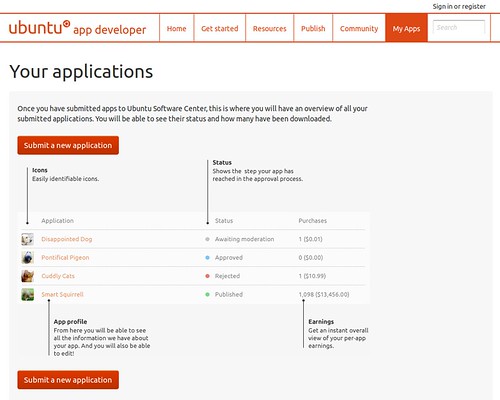
Getting your app in Ubuntu has never been easier!
Commercial applications will be reviewed by the Canonical apps team and free apps will be reviewed by the Ubuntu community Application Review Board team. When your app passes some suitability assessments (e.g. ensuring it runs, installs correctly, does not include illegal or illicit content) it will be approved and added to the *Ubuntu Software Center*:
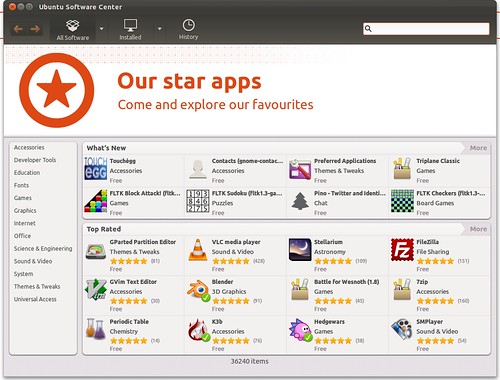
Installing your app on Ubuntu is only a click away for your users.
If you want to find out more about selling your apps on Ubuntu, be sure to see the [FAQ](https://developer.ubuntu.com/publish/commercial-software-faqs/).
## Getting Help
We want to provide a strong, supporting environment for developers. Be sure to see the following resources:
* **Mailing List** – [join](https://lists.ubuntu.com/mailman/listinfo/ubuntu-app-devel)
* **Support Channel** – [join](https://webchat.freenode.net/?channels=ubuntu-app-devel)
* **Ubuntu Developer Blog** – [subscribe](https://developer.ubuntu.com/?&feed=rss2)
* **@ubuntuappdev on Twitter** – [follow](https://twitter.com/#!/ubuntuappdev)
Be sure to share your ideas, comments, and news about apps that you are working on to bring to Ubuntu!

didrocks Is a Legend
’nuff said.
